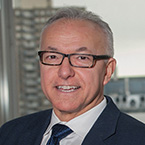
For demonstrating the role of the BCR/ABL oncogene in the pathogenesis of chronic myeloid leukemia, and for his creation of pluripotent stem cell-based disease models to improve drug and transplantation therapies for malignant and genetic diseases.
A distinguished leader in the fields of cancer and stem cell biology, Dr. Daley has made invaluable contributions to the advancement of cancer research and treatment, including pivotal findings that have revolutionized our understanding of chronic myeloid leukemia (CML). His observation that the P210bcr/abl protein is a product of the reciprocal translocation t(9;22)(q34;q11), or Philadelphia chromosome, and is a hallmark of CML led to subsequent studies demonstrating that the BCR/ABL fusion protein is directly capable of inducing CML. This pioneering work would later result in the development of the targeted therapeutic imatinib, which has dramatically improved treatment outcomes for CML patients. More recently, Dr. Daley has built upon this research by investigating imatinib resistance mechanisms, which have further informed novel treatment combination regimens for CML patients.
In addition to his groundbreaking contributions to the understanding of leukemia pathogenesis, he has also made important discoveries in the stem cell biology field, focusing his research on understanding how to harness stem cells to improve drug and transplantation therapies for patients with malignant and genetic bone marrow disease. His research contributions led to the first successful application of somatic cell nuclear transfer to treat a Rag2-mutated immune deficiency mouse model. In these cutting-edge experiments, wild type Rag2 genes were introduced via homologous recombination into embryonic stem cells, which were then induced to differentiate into hematopoietic stem cells. His findings also include the differentiation of germ cells from somatic cells, generating disease-specific induced pluripotent stem cells from reprogrammed human fibroblasts, and uncovering the critical role of the LIN28/let-7 pathway in cell metabolism and its interplay with cancer as well as its role in normal embryonic development.
Career Highlights
2017 Public Service Award, International Society for Stem Cell Research
2012 A. Clifford Barger Excellence in Mentoring Award, Harvard Medical School
2012 Rowley Prize, International CML Foundation
2011 E. Donnall Thomas Prize, American Society of Hematology
2011 Elected Fellow, American Academy of Arts and Sciences
2011 Elected Member, National Academy of Medicine
2010 Elected Member, Association of American Physicians
2009 Society for Pediatric Research Award in Honor of E. Mead Johnson
2009 Medical Research Award, Greater Boston Sickle Cell Disease Association
2008 Elected Member, American Pediatric Society
2008 Mentoring Award, Harvard Division of Biological ad Biomedical Sciences
2006 Judson Daland Prize, American Philosophical Society
2006 Elected Fellow, American Association for the Advancement of Science
2004 Stohlman Award, Leukemia Society of America
2003 Elected Member, American Society for Clinical Investigation
1999 Scholar Award, Leukemia and Lymphoma Society of America